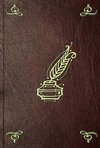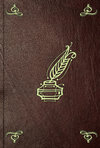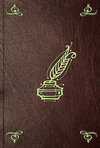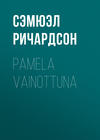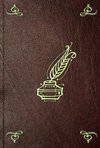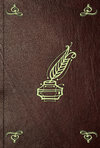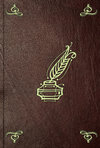Читать книгу: «Clarissa Harlowe; or the history of a young lady — Volume 2»
THE HISTORY OF CLARISSA HARLOWE
LETTER I
MISS CLARISSA HARLOWE, TO MISS HOWE
My heart fluttered with the hope and the fear of seeing my mother, and with the shame and grief of having given her so much uneasiness. But it needed not: she was not permitted to come. But my aunt was so good as to return, yet not without my sister; and, taking my hand, made me sit down by her.
She came, she must own, officiously, she said, this once more, though against the opinion of my father: but knowing and dreading the consequence of my opposition, she could not but come.
She then set forth to my friends' expectation from me; Mr. Solmes's riches (three times as rich he came out to be, as any body had thought him); the settlements proposed; Mr. Lovelace's bad character; their aversions to him; all in a very strong light; not in a stronger than my mother had before placed them in. My mother, surely, could not have given the particulars of what had passed between herself and me: if she had, my aunt would not have repeated many of the same sentiments, as you will find she did, that had been still more strongly urged, without effect by her venerable sister.
She said it would break the heart of my father to have it imagined that he had not a power over his own child; and that, as he thought, for my own good: a child too, whom they had always doated upon!—Dearest, dearest Miss, concluded she, clasping her fingers, with the most condescending earnestness, let me beg of you, for my sake, for your own sake, for a hundred sakes, to get over this averseness, to give up your prejudices, and make every one happy and easy once more.—I would kneel to you, my dearest Niece—nay, I will kneel to you—!
And down she dropt, and I with her, kneeling to her, and beseeching her not to kneel; clasping my arms about her, and bathing her worthy bosom with my tears.
O rise! rise! my beloved Aunt, said I: you cut me to the heart with this condescending goodness.
Say then, my dearest Niece, say then, that you will oblige all your friends!—If you love us, I beseech you do—
How can I perform what I can sooner choose to die than to perform—!
Say then, my dear, that you will consider of it. Say you will but reason with yourself. Give us but hopes. Don't let me entreat, and thus entreat, in vain—[for still she kneeled, and I by her].
What a hard case is mine!—Could I but doubt, I know I could conquer.—That which is an inducement to my friends, is none at all to me—How often, my dearest Aunt, must I repeat the same thing?—Let me but be single—Cannot I live single? Let me be sent, as I have proposed, to Scotland, to Florence, any where: let me be sent a slave to the Indies, any where—any of these I will consent to. But I cannot, cannot think of giving my vows to man I cannot endure!
Well then, rising, (Bella silently, with uplifted hands, reproaching my supposed perverseness,) I see nothing can prevail with you to oblige us.
What can I do, my dearest Aunt Hervey? What can I do? Were I capable of giving a hope I meant not to enlarge, then could I say, I would consider of your kind advice. But I would rather be thought perverse than insincere. Is there, however, no medium? Can nothing be thought of? Will nothing do, but to have a man who is the more disgustful to me, because he is unjust in the very articles he offers?
Whom now, Clary, said my sister, do you reflect upon? Consider that.
Make not invidious applications of what I say, Bella. It may not be looked upon in the same light by every one. The giver and the accepter are principally answerable in an unjust donation. While I think of it in this light, I should be inexcusable to be the latter. But why do I enter upon a supposition of this nature?—My heart, as I have often, often said, recoils, at the thought of the man, in every light.—Whose father, but mine, agrees upon articles where there is no prospect of a liking? Where the direct contrary is avowed, all along avowed, without the least variation, or shadow of a change of sentiment?—But it is not my father's doing originally. O my cruel, cruel brother, to cause a measure to be forced upon me, which he would not behave tolerably under, were the like to be offered to him!
The girl is got into her altitudes, Aunt Hervey, said my sister. You see, Madam, she spares nobody. Be pleased to let her know what she has to trust to. Nothing is to be done with her. Pray, Madam, pronounce her doom.
My aunt retired to the window, weeping, with my sister in her hand: I cannot, indeed I cannot, Miss Harlowe, said she, softly, (but yet I heard every word she said): there is great hardship in her case. She is a noble child after all. What pity things are gone so far!—But Mr. Solmes ought to be told to desist.
O Madam, said my sister, in a kind of loud whisper, are you caught too by the little siren?—My mother did well not to come up!—I question whether my father himself, after his first indignation, would not be turned round by her. Nobody but my brother can do any thing with her, I am sure.
Don't think of your brother's coming up, said my aunt, still in a low voice—He is too furious. I see no obstinacy, no perverseness, in her manner! If your brother comes, I will not be answerable for the consequences: for I thought twice or thrice she would have gone into fits.
O Madam, she has a strong heart!—And you see there is no prevailing with her, though you were upon your knees to her.
My sister left my aunt musing at the window, with her back towards us, and took that opportunity to insult me still more barbarously; for, stepping to my closet, she took up the patterns which my mother had sent me up, and bringing them to me, she spread them upon the chair by me; and offering one, and then another, upon her sleeve and shoulder, thus she ran on, with great seeming tranquility, but whisperingly, that my aunt might not hear her. This, Clary, is a pretty pattern enough: but this is quite charming! I would advise you to make your appearance in it. And this, were I you, should be my wedding night-gown—And this my second dressed suit! Won't you give orders, love, to have your grandmother's jewels new set?—Or will you thing to shew away in the new ones Mr. Solmes intends to present to you? He talks of laying out two or three thousand pounds in presents, child! Dear heart!—How gorgeously will you be array'd! What! silent still?—But, Clary, won't you have a velvet suit? It would cut a great figure in a country church, you know: and the weather may bear it for a month yet to come. Crimson velvet, suppose! Such a fine complexion as yours, how it would be set off by it! What an agreeable blush would it give you!—Heigh-ho! (mocking me, for I sighed to be thus fooled with,) and do you sigh, love?—Well then, as it will be a solemn wedding, what think you of black velvet, child?—Silent still, Clary?—Black velvet, so fair as you are, with those charming eyes, gleaming through a wintry cloud, like an April sun!—Does not Lovelace tell you they are charming eyes?—How lovely will you appear to every one!—What! silent still, love?—But about your laces, Clary?—
She would have gone on still further, had not my aunt advance towards me, wiping her eyes—What! whispering ladies! You seem so easy and so pleased, Miss Harlowe, with your private conference, that I hope I shall carry down good news.
I am only giving her my opinion of her patterns, here.—Unasked indeed; but she seems, by her silence, to approve of my judgment.
O Bella! said I, that Mr. Lovelace had not taken you at your word!—You had before now been exercising your judgment on your own account: and I had been happy as well as you! Was it my fault, I pray you, that it was not so?—
O how she raved!
To be so ready to give, Bella, and so loth to take, is not very fair in you.
The poor Bella descended to call names.
Why, Sister, said I, you are as angry, as if there were more in the hint than possibly might be designed. My wish is sincere, for both our sakes!—for the whole family's sake!—And what (good now) is there in it?—Do not, do not, dear Bella, give me cause to suspect, that I have found a reason for your behaviour to me, and which till now was wholly unaccountable from sister to sister—
Fie, fie, Clary! said my aunt.
My sister was more and more outrageous.
O how much fitter, said I, to be a jest, than a jester!—But now, Bella, turn the glass to you, and see how poorly sits the robe upon your own shoulders, which you have been so unmercifully fixing upon mine!
Fie, fie, Miss Clary! repeated my aunt.
And fie, fie, likewise, good Madam, to Miss Harlowe, you would say, were you to have heard her barbarous insults!
Let us go, Madam, said my sister, with great violence; let us leave the creature to swell till she bursts with her own poison.—The last time I will ever come near her, in the mind I am in!
It is so easy a thing, returned I, were I to be mean enough to follow an example that is so censurable in the setter of it, to vanquish such a teasing spirit as your's with its own blunt weapons, that I am amazed you will provoke me!—Yet, Bella, since you will go, (for she had hurried to the door,) forgive me. I forgive you. And you have a double reason to do so, both from eldership and from the offence so studiously given to one in affliction. But may you be happy, though I never shall! May you never have half the trials I have had! Be this your comfort, that you cannot have a sister to treat you as you have treated me!—And so God bless you!
O thou art a—And down she flung without saying what.
Permit me, Madam, said I to my aunt, sinking down, and clasping her knees with my arms, to detain you one moment—not to say any thing about my poor sister—she is her own punisher—only to thank you for all your condescending goodness to me. I only beg of you not to impute to obstinacy the immovableness I have shown to so tender a friend; and to forgive me every thing I have said or done amiss in your presence, for it has not proceeded from inward rancour to the poor Bella. But I will be bold to say, that neither she, nor my brother, nor even my father himself, knows what a heart they have set a bleeding.
I saw, to my comfort, what effect my sister's absence wrought for me.—Rise, my noble-minded Niece!—Charming creature! [those were her kind words] kneel not to me!—Keep to yourself what I now say to you.—I admire you more than I can express—and if you can forbear claiming your estate, and can resolve to avoid Lovelace, you will continue to be the greatest miracle I ever knew at your years—but I must hasten down after your sister.—These are my last words to you: 'Conform to your father's will, if you possibly can. How meritorious will it be in you if you do so! Pray to God to enable you to conform. You don't know what may be done.'
Only, my dear Aunt, one word, one word more (for she was going)—Speak all you can for my dear Mrs. Norton. She is but low in the world: should ill health overtake her, she may not know how to live without my mamma's favour. I shall have no means to help her; for I will want necessaries before I will assert my right: and I do assure you, she has said so many things to me in behalf of my submitting to my father's will, that her arguments have not a little contributed to make me resolve to avoid the extremities, which nevertheless I pray to God they do not at last force me upon. And yet they deprive me of her advice, and think unjustly of one of the most excellent of women.
I am glad to hear you say this: and take this, and this, and this, my charming Niece! (for so she called me almost at every word, kissing me earnestly, and clasping her arms about my neck:) and God protect you, and direct you! But you must submit: indeed you must. Some one day in a month from this is all the choice that is left you.
And this, I suppose, was the doom my sister called for; and yet no worse than what had been pronounced upon me before.
She repeated these last sentences louder than the former. 'And remember, Miss,' added she, 'it is your duty to comply.'—And down she went, leaving me with my heart full, and my eyes running over.
The very repetition of this fills me with almost equal concern to that which I felt at the time.
I must lay down my pen. Mistiness, which give to the deluged eye the appearance of all the colours in the rainbow, will not permit me to write on.
WEDNESDAY, FIVE O'CLOCK
I will now add a few lines—My aunt, as she went down from me, was met at the foot of the stairs by my sister, who seemed to think she had staid a good while after her; and hearing her last words prescribing to me implicit duty, praised her for it, and exclaimed against my obstinacy. Did you ever hear of such perverseness, Madam? said she: Could you have thought that your Clarissa and every body's Clarissa, was such a girl?—And who, as you said, is to submit, her father or she?
My aunt said something in answer to her, compassionating me, as I thought, by her accent: but I heard not the words.
Such a strange perseverance in a measure so unreasonable!—But my brother and sister are continually misrepresenting all I say and do; and I am deprived of the opportunity of defending myself!—My sister says,1 that had they thought me such a championess, they you not have engaged with me: and now, not knowing how to reconcile my supposed obstinacy with my general character and natural temper, they seem to hope to tire me out, and resolve to vary their measures accordingly. My brother, you see,2 is determined to carry this point, or to abandon Harlowe-place, and never to see it more. So they are to lose a son, or to conquer a daughter—the perversest and most ungrateful that ever parents had!—This is the light he places things in: and has undertaken, it seems, to subdue me, if his advice should be followed. It will be farther tried; of that I am convinced; and what will be their next measure, who can divine?
I shall dispatch, with this, my answer to your's of Sunday last, begun on Monday;3 but which is not yet quite finished. It is too long to copy: I have not time for it. In it I have been very free with you, my dear, in more places than one. I cannot say that I am pleased with all I have written—yet will not now alter it. My mind is not at ease enough for the subject. Don't be angry with me. Yet, if you can excuse one or two passages, it will be because they were written by
Your CLARISSA HARLOWE.
LETTER II
MISS HOWE, TO MISS CLARISSA HARLOWE WEDNESDAY NIGHT, MARCH 22
ANGRY!—What should I be angry for? I am mightily pleased with your freedom, as you call it. I only wonder at your patience with me; that's all. I am sorry I gave you the trouble of so long a letter upon the occasion,4 notwithstanding the pleasure I received in reading it.
I believe you did not intend reserves to me: for two reasons I believe you did not: First, because you say you did not: Next, because you have not as yet been able to convince yourself how it is to be with you; and persecuted as you are, how so to separate the effects that spring from the two causes [persecution and love] as to give to each its particular due. But this I believe I hinted to you once before; and so will say no more upon this subject at present.
Robin says, you had but just deposited your last parcel when he took it: for he was there but half an hour before, and found nothing. He had seen my impatience, and loitered about, being willing to bring me something from you, if possible.
My cousin Jenny Fynnett is here, and desires to be my bedfellow to-night. So I shall not have an opportunity to sit down with that seriousness and attention which the subjects of yours require. For she is all prate, you know, and loves to set me a prating; yet comes upon a very grave occasion—to procure my mother to go with her to her grandmother Larking, who has long been bed-ridden; and at last has taken it into her head that she is mortal, and therefore will make her will; a work she was till now extremely averse to; but it must be upon condition that my mother, who is her distant relation, will go to her, and advise her as to the particulars of it: for she has a high opinion, as every one else has, of my mother's judgment in all matters relating to wills, settlements, and such-like notable affairs.
Mrs. Larking lives about seventeen miles off; and as my mother cannot endure to lie out of her own house, she proposes to set out early in the morning, that she might be able to get back again at night. So, to-morrow I shall be at your devotion from day-light to day-light; nor will I be at home to any body.
I have hinted before, that I could almost wish my mother and Mr. Hickman would make a match of it: and I here repeat my wishes. What signifies a difference of fifteen or twenty years; especially when the lady has spirits that will make her young a long time, and the lover is a mighty sober man?—I think, verily, I could like him better for a papa, than for a nearer relation: and they are strange admirers of one another.
But allow me a perhaps still better (and, as to years, more suitable and happier) disposal; for the man at least.—What think you, my dear, of compromising with your friends, by rejecting both men, and encouraging my parader?—If your liking one of the two go no farther than conditional, I believe it will do. A rich thought, if it obtain your approbation! In this light, I should have a prodigious respect for Mr. Hickman; more by half than I can have in the other. The vein is opened—Shall I let it flow? How difficult to withstand constitutional foibles!
Hickman is certainly a man more in your taste than any of those who have hitherto been brought to address you. He is mighty sober, mighty grave, and all that. Then you have told me, that he is your favourite. But that is because he is my mother's perhaps. The man would certainly rejoice at the transfer; or he must be a greater fool than I take him to be.
O but your fierce lover would knock him o' the head—I forgot that!—What makes me incapable of seriousness when I write about Hickman?—Yet the man so good a sort of man in the main!—But who is perfect? This is one of my foibles: and it is something for you to chide me for.
You believe me to be very happy in my prospect in relation to him: because you are so very unhappy in the foolish usage you meet with, you are apt (as I suspect) to think that tolerable which otherwise would be far from being so. I dare say, you would not, with all your grave airs, like him for yourself; except, being addressed by Solmes and him, you were obliged to have one of them.—I have given you a test. Let me see what you will say to it.
For my own part, I confess to you, that I have great exceptions to Hickman. He and wedlock never yet once entered into my head at one time. Shall I give you my free thoughts of him?—Of his best and his worst; and that as if I were writing to one who knows him not?—I think I will. Yet it is impossible I should do it gravely. The subject won't bear to be so treated in my opinion. We are not come so far as that yet, if ever we shall: and to do it in another strain, ill becomes my present real concern for you.
Here I was interrupted on the honest man's account. He has been here these two hours—courting the mother for the daughter, I suppose—yet she wants no courting neither: 'Tis well one of us does; else the man would have nothing but halcyon; and be remiss, and saucy of course.
He was going. His horses at the door. My mother sent for me down, pretending to want to say something to me.
Something she said when I came that signified nothing—Evidently, for no reason called me, but to give me an opportunity to see what a fine bow her man could make; and that she might wish me a good night. She knows I am not over ready to oblige him with my company, if I happen to be otherwise engaged. I could not help an air a little upon the fretful, when I found she had nothing of moment to say to me, and when I saw her intention.
She smiled off the visible fretfulness, that the man might go away in good humour with himself.
He bowed to the ground, and would have taken my hand, his whip in the other. I did not like to be so companioned: I withdrew my hand, but touched his elbow with a motion, as if from his low bow I had supposed him falling, and would have helped him up—A sad slip, it might have been! said I.
A mad girl! smiled it off my mother.
He was quite put out; took his horse-bridle, stumped back, back, back, bowing, till he run against his servant. I laughed. He mounted his horse. I mounted up stairs, after a little lecture; and my head is so filled with him, that I must resume my intention, in hopes to divert you for a few moments.
Take it then—his best, and his worst, as I said before.
Hickman is a sort of fiddling, busy, yet, to borrow a word from you, unbusy man: has a great deal to do, and seems to me to dispatch nothing. Irresolute and changeable in every thing, but in teasing me with his nonsense; which yet, it is evident, he must continue upon my mother's interest more than upon his own hopes; for none have I given him.
Then I have a quarrel against his face, though in his person, for a well-thriven man, tolerably genteel—Not to his features so much neither; for what, as you have often observed, are features in a man?—But Hickman, with strong lines, and big cheek and chin bones, has not the manliness in his aspect, which Lovelace has with the most regular and agreeable features.
Then what a set and formal mortal he is in some things!—I have not been able yet to laugh him out of his long bid and beads. Indeed, that is, because my mother thinks they become him; and I would not be so free with him, as to own I should choose to have him leave it off. If he did, so particular is the man, he would certainly, if left to himself, fall into a King-William's cravat, or some such antique chin-cushion, as by the pictures of that prince one sees was then the fashion.
As to his dress in general, he cannot indeed be called a sloven, but sometimes he is too gaudy, at other times too plain, to be uniformly elegant. And for his manners, he makes such a bustle with them, and about them, as would induce one to suspect that they are more strangers than familiars to him. You, I know, lay this to his fearfulness of disobliging or offending. Indeed your over-doers generally give the offence they endeavour to avoid.
The man however is honest: is of family: has a clear and good estate; and may one day be a baronet, an't please you. He is humane and benevolent, tolerably generous, as people say; and as I might say too, if I would accept of his bribes; which he offers in hopes of having them all back again, and the bribed into the bargain. A method taken by all corrupters, from old Satan, to the lowest of his servants. Yet, to speak in the language of a person I am bound to honour, he is deemed a prudent man; that is to say a good manager.
Then I cannot but confess, that now I like not anybody better, whatever I did once.
He is no fox-hunter: he keeps a pack indeed; but prefers not his hounds to his fellow-creatures. No bad sign for a wife, I own. He loves his horse; but dislikes racing in a gaming way, as well as all sorts of gaming. Then he is sober; modest; they say, virtuous; in short, has qualities that mothers would be fond of in a husband for their daughters; and for which perhaps their daughters would be the happier could they judge as well for themselves, as experience possibly may teach them to judge for their future daughters.
Nevertheless, to own the truth, I cannot say I love the man: nor, I believe, ever shall.
Strange! that these sober fellows cannot have a decent sprightliness, a modest assurance with them! Something debonnaire; which need not be separated from that awe and reverence, when they address a woman, which should shew the ardour of their passion, rather than the sheepishness of their nature; for who knows not that love delights in taming the lion-hearted? That those of the sex, who are most conscious of their own defect in point of courage, naturally require, and therefore as naturally prefer, the man who has most of it, as the most able to give them the requisite protection? That the greater their own cowardice, as it would be called in a man, the greater is their delight in subjects of heroism? As may be observed in their reading; which turns upon difficulties encountered, battles fought, and enemies overcome, four or five hundred by the prowess of one single hero, the more improbable the better: in short, that their man should be a hero to every one living but themselves; and to them know no bound to his humility. A woman has some glory in subduing a heart no man living can appall; and hence too often the bravo, assuming the hero, and making himself pass for one, succeeds as only a hero should.
But as for honest Hickman, the good man is so generally meek, as I imagine, that I know not whether I have any preference paid me in his obsequiousness. And then, when I rate him, he seems to be so naturally fitted for rebuke, and so much expects it, that I know not how to disappoint him, whether he just then deserve it, or not. I am sure, he has puzzled me many a time when I have seen him look penitent for faults he has not committed, whether to pity or laugh at him.
You and I have often retrospected the faces and minds of grown people; that is to say, have formed images for their present appearances, outside and in, (as far as the manners of the persons would justify us in the latter) what sort of figures they made when boys and girls. And I'll tell you the lights in which HICKMAN, SOLMES, and LOVELACE, our three heroes, have appeared to me, supposing them boys at school.
Solmes I have imagined to be a little sordid, pilfering rogue, who would purloin from every body, and beg every body's bread and butter from him; while, as I have heard a reptile brag, he would in a winter-morning spit upon his thumbs, and spread his own with it, that he might keep it all to himself.
Hickman, a great overgrown, lank-haired, chubby boy, who would be hunched and punched by every body; and go home with his finger in his eye, and tell his mother.
While Lovelace I have supposed a curl-pated villain, full of fire, fancy, and mischief; an orchard-robber, a wall-climber, a horse-rider without saddle or bridle, neck or nothing: a sturdy rogue, in short, who would kick and cuff, and do no right, and take no wrong of any body; would get his head broke, then a plaster for it, or let it heal of itself; while he went on to do more mischief, and if not to get, to deserve, broken bones. And the same dispositions have grown up with them, and distinguish them as me, with no very material alteration.
Only that all men are monkeys more or less, or else that you and I should have such baboons as these to choose out of, is a mortifying thing, my dear.
I am sensible that I am a little out of season in treating thus ludicrously the subject I am upon, while you are so unhappy; and if my manner does not divert you, as my flightiness used to do, I am inexcusable both to you, and to my own heart: which, I do assure you, notwithstanding my seeming levity, is wholly in your case.
As this letter is extremely whimsical, I will not send it until I can accompany it with something more solid and better suited to your unhappy circumstances; that is to say, to the present subject of our correspondence. To-morrow, as I told you, will be wholly my own, and of consequence yours. Adieu, therefore, till then.
See Letter XLII. of Vol. I.
[Закрыть]
Ibid.
[Закрыть]
See Letter XL, ibid.
[Закрыть]
See Vol. I, Letter XXXVII, for the occasion; and Letters XXXVIII. and XL. of the same volume, for the freedom Clarissa apologizes for.
[Закрыть]
Покупайте книги и получайте бонусы в Литрес, Читай-городе и Буквоеде.
Участвовать в бонусной программе













